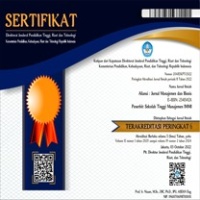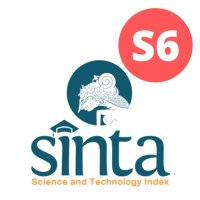POLA ASUH ORANG TUA DAN KONFORMITAS TEMAN SEBAYA SERTA PENGARUHNYA TERHADAP KENAKALAN REMAJA
Abstract
Juvenile Delinquency is a form of conflicts that are not resolved properly due to improper parenting and the consequences of relationships with peers. Adolescents are vulnerable people, so the environment plays an important role in the formation of adolescent behavior both in the family environment and in the community, especially social relations with peers. This study aims to determine the effect of parenting and peer conformity on juvenile delinquency. The population of this study were all students of Muhammadiyah 1 Tangerang Selatan Vocational School totaling 440 students, while the research sample consisted of 200 students. Data collection using; 1. The Parental Authority Questionnaire Scale developed by Buri (1991), 2. The scale developed by the researcher based on the dimensions of Sears (2002) theory, 3. The scale that is also developed by researchers based on Jensen's (1985) theory dimensions. The data obtained were analyzed using multiple regression with SPSS version 17 software and for testing the construct validity using CFA (Confirmatory factor analysis) with the help of LISREL software version 8.7. The results showed that; 1. Parenting and peer conformity have a significant effect on juvenile delinquency, 2. The proportion of variance from juvenile delinquency that is influenced by independent variables is 55.6% and the remaining 44.4% is influenced by other variables outside this study.
Keywords
Full Text:
PDFReferences
Arifin, M. (1992). Pedoman Pelaksanaan Bimbingan dan Penyuluhan Agama. Jakarta: Golden Trayon Press.
Baron, R.A & Byrne. (2005). Social Psycology (Psikologi Sosial). Tahun 10 Edisi ke-2. Jakarta: Erlangga.
Berk, L.E. (1994). Child Development. Boston: Mc. Graw-Hill Inc.
BKKBN. (2011). Fenomena Kenakalan Remaja di Indonesia. bkkbn.go.id.
Chaplin, J.P. (2006). Kamus Lengkap Psikologi. Jakarta: PT. Raja Grafindo Persada.
Daniati, A.T. & Abdullah MS. (2007). Hubungan Antara Berfikir Positif dengan
Kecenderungan Berperilaku Delinquency pada Remaja. Universitas Wangsa Manggala: Jurnal Fakultas Psikologi.
Dariyo, A. (2004). Psikologi Perkembangan Remaja. Bogor: Ghalia Indonesia.
Darling, N. & Toyokawa T. (1999). Parenting Style Inventory II. Department of Human Development and Family Studies the Pennsylvania State University.
Davidoff, Linda L. (1991). Psikologi Suatu Pengantar. Edisi ke-2 Jilid 2. Jakarta: Erlangga.
Desmita. (2005). Psikologi Perkembangan. Bandung: PT. Remaja Karya Rosdakarya.
Dusek, J.B. (1996). Adolescence & Development Behavior. New Jersey: Prentice Hall.
Daradjat, Z. (1994). Remaja: Harapan dan Tantangan. Jakarta: CV. Ruhama.
Daradjat, Z. (1996). Kesehatan Mental. Jakarta: PT. Toko Gunung Agung.
Febrika, R. (2004). Gambaran Harga Diri Remaja Delinkuen Penghuni Lembaga Pemasyarakatan Dibanding Remaja Non Delinkuen, Skripsi. Depok: Fakultas Psikologi Universitas Indonesia.
Gerungan, W.A. (2001). Psikologi Sosial. Bandung: PT. Eresco.
Gunarsa, S.D. (2000). Psikologi Remaja. Jakarta: BPK Gunung Mulia.
Hurlock, E.B. (2002). Perkembangan Anak. Jilid 1 & 2. Jakarta: Erlangga.
Iska. (2003). Hubungan Pola Asuh Orangtua dan Sikap Remaja terhadap Prenalital Sex di Jakarta, Tesis. Jakarta: Pascasarjana Fakultas Psikologi Universitas Indonesia.
Kurniasih, R. (2004). Pengaruh Pola Asuh terhadap Kepercayaan Diri Anak, Skripsi. Jakarta: Fakultas Psikologi UIN Syarif Hidayatullah Jakarta.
Nasir, S.A. (1999). Peranan Pendidikan Agama terhadap Pemecahan Problem Remaja. Jakarta: Kalam Mulia.
Sudarsono. (1991). Etika Islam tentang Kenakalan Remaja. Jakarta: Rineka Cipta.
Sudarsono. (2004). Kenakalan Remaja: Prevensi, Rehabilitasi dan Resosialisasi. Jakarta: Rineka Cipta.
DOI: https://doi.org/10.46975/aliansi.v13i1.17
Refbacks
- There are currently no refbacks.
Copyright (c) 2020 Rizawati Rizawati

This work is licensed under a Creative Commons Attribution 4.0 International License.
ISSN : 2541-545X
Published by:
Universitas Mitra Bangsa
Jl. Tanjung Barat No. 11 Jakarta Selatan
Telp: (021) 7817823 Fax: (021) 7815144
Website: https://umiba.ac.id/











